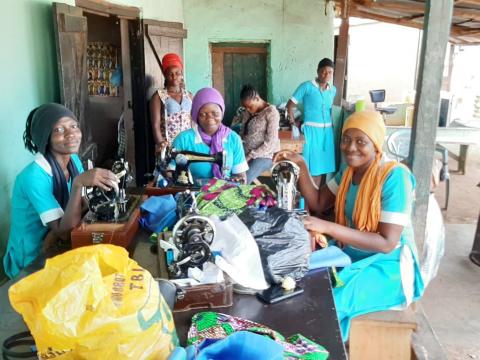Child health and protection no longer the sole responsibility of women in Talensi and West Gonja

By Rev. Seth Acquaye - Faith & Development Manager at World Vision in Ghana
How could children experience proper care and protection solely under the responsibility of women who are deprived of major resources in the community? Is it possible to claim ownership of anything without accepting responsibility in nurturing and caring for its growth and development? This was a norm and an acceptable practice in traditional communities where cultural and societal norms prevented men from directly caring for and protecting their children. Many children thereby suffered poor education, ill-health and poor protection until the Channels of Hope (CoH) approach was introduced.
In rural communities, aside the Chiefs and “Tendaanas” (land custodians), faith leaders have great respect and honour and wield so much power and authority, which enable them to have much control over resources. They also direct and ensure the spiritual growth of people in the area. Faith leaders in rural communities in Ghana, therefore, possess a great potential to positively impact on children’s well-being. These faith leaders weekly attend to the spiritual and physical needs of people by administering to them in churches and mosques. However, because some religious practices were knotted into the culture of the people, coupled with faith leaders’ low knowledge of child health and protection, religious sermons on child health and child protection were previously barely heard from the Church or Mosque. Such messages were deemed as secular and ungodly and would have to be handled by government workers and professionals.
The introduction of CoH, Maternal and Newborn Child Health (MNCH), and Child Protection (CP) soon became the transforming rudiments of this ugly phenomenon of men holding much power and authority but with little influence on or support for children’s welfare. To ensure that faith leaders were empowered in advocacy methods and scriptures-based technical knowledge, World Vision trained 120 faith leaders (Christians and Muslims) on CoH MNCH and CP, and catalysed and supported them to form 46 CHATs (Congregational/Community Hope Action Teams).
These faith leaders, subsequently, began preaching against child marriages, all forms of violence against children, child labour and other harmful cultural practices using relevant scriptural verses either from the Bible or Quran in over 100 communities. These leaders also pledged their unflinching support for children’s rights and participation in decision-making within households and community levels.
On positive child discipline, the Chief Imam of Pwalungu Mosque indicated: “I have used relevant scriptures and preached against harmful cultural practices that impede child development in my Mosque. More children conduct themselves well than previously. With this knowledge on child discipline, we have become ambassadors of child protection in our congregation and the community at large”.
During World Vision's 2019 fiscal year (October 2018-September 2019), over 1,000 youth (460 boys and 540 girls) were educated by faith leaders on child rights, health, and protection, including how to identify and report various forms of abuse at Zabzugu. About 13 adolescents from deprived households were identified and supported with employable skill training to enable them generate sustainable income for their livelihoods. The skills acquired by the adolescents included dressmaking/tailoring, as well as bead and soap making.
Rev. Joseph Achintri, a trainer in CoH, MNCH and CP from West Gonja, also revealed that: “Women no longer deliver at home; resulting in reduced deaths among babies and mothers. Newly born babies are also offered their mothers’ breasts to suck for milk, instead of mothers spilling it away with the myth that it was bad to feed children with such fresh milk. With proper birth spacing and care for children, proper nutrition for pregnant and new mothers, our communities have seen improved health of mothers and children, and improved access to health services, over the past three years than previously”, Rev. Achintri affirmed.
With the consistent education of people by faith leaders and the CHAT groups on maternal and child health and protection, “Men have now accepted the role of caring for and facilitating their children and pregnant wives to hospitals, as well as performing domestic chores that previously were exclusively to be undertaken by women. Much thanks to World Vision and implementers of CoH in communities”, Rev. Achintri appreciated.